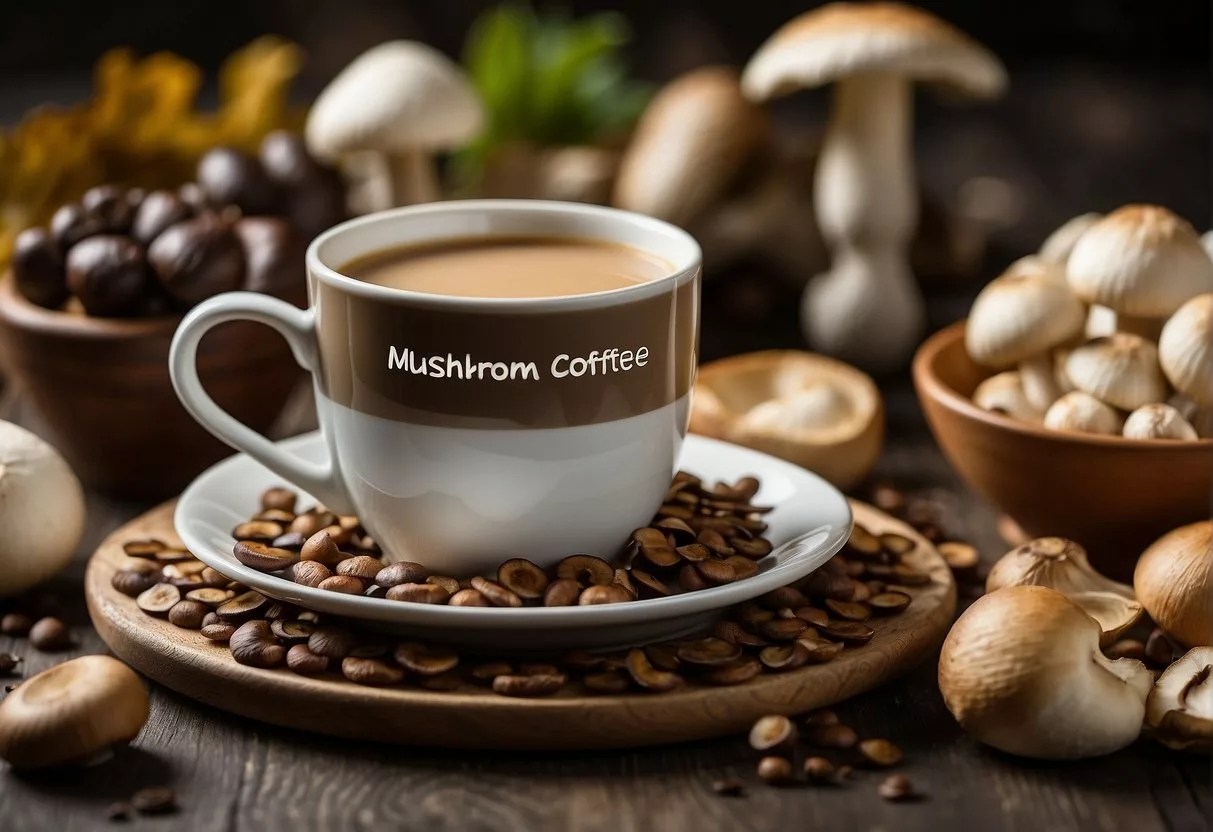Mushroom coffee has been gaining popularity as a beverage that purports to combine the benefits of coffee and medicinal mushrooms in one cup. Although it typically contains less caffeine than regular coffee, it is still important for consumers to understand the associated risks and benefits of introducing this drink into their daily routine.
Proponents of mushroom coffee argue that it offers a more balanced energy boost without the jitters and crash often associated with high-caffeine beverages. Meanwhile, skeptics point to the need for more comprehensive research on the effects.
From a health perspective, the addition of mushrooms such as reishi, chaga, lion’s mane, and cordyceps is believed to bring various benefits, from immune system support to improved cognitive function. However, individuals with sensitivities to mushrooms or specific health conditions should approach mushroom coffee with caution, as it may not be suitable for everyone.
The long-term health implications are also a matter for consideration, as the interaction between mushroom extracts and caffeine is not fully understood.
Health Benefits and Nutritional Value
Mushroom coffee blends traditional coffee with powerful medicinal mushrooms to enhance health benefits without sacrificing taste.
This innovation combines the caffeine boost of coffee with the rich nutritional profile of fungi like chaga, reishi, and lion’s mane, known for their adaptogenic properties.

Nutritional Profile and Antioxidant Properties
Mushroom coffee typically includes a mixture of ground coffee and powdered medicinal mushrooms such as chaga, reishi, cordyceps, lion’s mane, and shiitake.
These mushrooms are revered for their antioxidant content, notably polyphenols and polysaccharides, which combat oxidative stress and may slow the aging process. Shiitake mushrooms, for example, are sourced for their high levels of minerals and B vitamins.
- Antioxidant Compounds Found in Medicinal Mushrooms
- Polyphenols: Combat oxidative stress and offer anti-aging benefits.
- Polysaccharides: Support immune function and overall vitality.
Positive Impact on Immunity and Inflammation
Mushroom extracts, particularly from species like reishi and chaga, contain compounds that can help strengthen the immune system.
Reishi mushrooms are often referred to as a superfood for their ability to enhance immune function and contain beta-glucans, a type of polysaccharide with immune-boosting properties. These mushrooms are also known to possess anti-inflammatory benefits, which can help maintain overall health and guard against a variety of diseases.
- Immune-Enhancing Components
- Beta-glucans: Important for immune defense.
- Prebiotics: Improve gut health, which is closely tied to immune health.
Mental Health and Adaptogenic Benefits
Adaptogens, like those found in lion’s mane and cordyceps, help the body resist stressors of all kinds, be it physical or emotional.
These compounds can positively affect mood and reduce stress. Lion’s mane specifically has been recognized for its potential to improve brain health, including memory and cognitive function, due to its nerve growth factors.
These adaptogens also contribute to consistent energy levels, potentially offsetting the jitteriness caused by caffeine.
Potential Risks and Considerations

Understanding the risks associated with mushroom coffee is essential, especially in terms of side effects, interactions with medications, and its impact on various populations.
It’s important to note that while mushroom coffee can offer certain health benefits, it also carries potential risks that consumers need to be aware of.
Side Effects and Interactions
Mushroom coffee often contains medicinal mushrooms such as reishi, chaga, lion’s mane (hericium erinaceus), and cordyceps, which may offer adaptogenic and anti-inflammatory properties. However, these mushrooms can also cause side effects.
For some people, mushroom extracts could lead to dizziness, itching, digestive discomfort, and rash. There’s also a risk of allergic reactions presenting symptoms like hives and difficulty breathing, particularly in individuals allergic to mushrooms.
The possibility of interactions with medications, especially those related to liver disease, diabetes, and heart health, should be given careful consideration.
For example, the ergothioneine in mushrooms can influence inflammation pathways and immune response, potentially affecting medication efficacy or leading to unforeseen side effects.
Comparative Caffeine Content and Sleep Implications
Mushroom coffee typically contains less caffeine than regular coffee, making it a coffee substitute for those looking to lower their caffeine intake.
While this reduced caffeine can prove beneficial for reducing jitters, anxiety, and improving sleep quality, it may not be suitable for those who depend on the higher caffeine content of traditional coffee for alertness.
It is important to remember that caffeine sensitivity varies widely, and even the lower caffeine levels in mushroom coffee could still impact sleep quality in sensitive individuals or those with sleep disorders.
Considerations for Specific Populations
When considering mushroom coffee, individuals with specific health concerns such as heart disease, cancer, or diabetes need to exercise caution.
The compounds found in medicinal mushrooms may interact with diseases and medications in unpredictable ways. Clinical trials are still ongoing to fully understand their long-term effects.
For populations like pregnant or breastfeeding women, the lack of comprehensive research into the effects of adaptogenic or anti-inflammatory compounds present in mushroom coffee means that it’s advisable to consult a healthcare provider before consumption.
Additionally, those prone to kidney stones should be aware that some medicinal mushrooms are high in oxalates, which can contribute to stone formation.
Lastly, while mushroom coffee is praised for having fiber and lower sugar content than traditional coffee, which can be beneficial for metabolic diseases, it’s crucial for individuals to consult with a healthcare professional, like a registered dietitian, before making significant dietary changes.